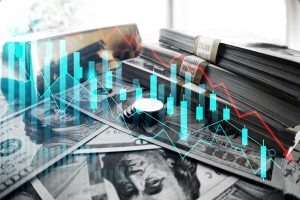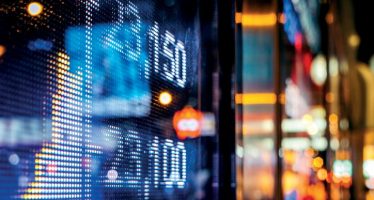Corporate Earnings Fine, Markets Not So Much: Seesawing Stock Markets Rattle Investors
 And just like that… the party was over. Wednesday’s stock market rally, sparked by the dovish comments of US Federal Reserve Chairperson Jay Powell, not only fizzled out but reversed with Nasdaq suffering its biggest drop since June 2020. The Nasdaq Composite, home to big tech, nosedived all of 5% in a single day of trading. The blue-chip S&P 500 retreated 3.5% whilst the Down Jones Industrial Average limited the damage to a still painful 3.1%.
And just like that… the party was over. Wednesday’s stock market rally, sparked by the dovish comments of US Federal Reserve Chairperson Jay Powell, not only fizzled out but reversed with Nasdaq suffering its biggest drop since June 2020. The Nasdaq Composite, home to big tech, nosedived all of 5% in a single day of trading. The blue-chip S&P 500 retreated 3.5% whilst the Down Jones Industrial Average limited the damage to a still painful 3.1%.
As the bears chased the bulls out of the (online) trading pits, many investors belatedly realized that the present is perhaps not such a good time after all, and Mr Powell jacking up rates – and promising more of the same – is not necessarily a good thing either. In a sign that investors and analysts are as clueless as the rest of us (including central bankers), trading volumes yesterday remained well within their 100-day moving average.
The gyrations of the stock market indicate heightened anxiety amongst investors over the fate of the economy as central banks struggle to contain inflation. Predictably, yields on government bonds spiked with the benchmark 10-year Treasury note fetching 3% – its highest level since 2018.
Upbeat corporate earnings reports failed to inject courage. Some market watchers blame the volatility on the US Federal Reserve’s own mixed messages. Indicating uncertainty about the origins of the sudden inflationary bout, the Fed unceremoniously ditched its theory that the trend was merely a ‘transitory’ phenomenon caused by the reopening of the economy after a year of covid-lockdowns and restrictions.
Difficult but Doable
Of late, the bank seems to harbour considerable concern about inflation’s duration and economic toll, acknowledging that it has little to no control over drivers such as the war in Ukraine and China’s indiscriminate lockdowns which assault already stressed global supply chains.
On Wednesday, Mr Powell admitted that taming inflation without causing a recession would be “very challenging” although the Fed chair clearly thought it doable as well.
A batch of data released on Thursday by the US Department of Labor shows a steep 11.6% rise in unit labour costs, fuelling fears of a price-wage spiral that – given the tight labour market – would prove hard to break.
Later today, the department is to release its closely watched monthly survey of the US labour market. Most analysts expect the economy to have added 380,000 new jobs last month. Any number significantly lower than that could well add to the gloom.
Gloom, No Doom
One London equity trader appealed to common sense by stating the obvious: “Growth forecasts have been downgraded, inflation expectations have been upgraded, and interest rates are rising.” The math seems to speak volumes.
The Bank of England added to the gloom by warning that the UK economy may slide into recession later this year due to high energy prices pushing up the rate of inflation north of 10%. On Thursday, the bank raised its reference rate by 25 basis points to 1% – the highest level since early 2009.
BoE Governor Andrew Bailey said he expects a “very sharp [economic] slowdown” and fully agreed with the bank’s Monetary Policy Committee whose nine members expressed regret for being “unable to prevent” hardship. In its remarkably downbeat assessment, the BoE said that UK households were likely to suffer a big squeeze on spending power – possibly the second largest since recordkeeping began in 1964. The bank forecasts another 40% hike of energy prizes by October on top of the record 54% jump registered in April.
Bleak House
The bank’s projections imply that the average UK household stands to lose an estimated £1,200 in spending power during 2022. Real post-tax disposable household income, arguably a more meaningful parameter, is expected to fall 1.75% this year – the biggest drop since 2011.
Though the economy is likely to just about avoid slipping into recession – two consecutive quarters of GDP shrinkage – the outlook remains bleak with 2023 unlikely to see growth beyond a paltry 0.25%. However, the BoE maintained its 2022 GDP forecast, keeping it at +3.75%. Over the first quarter, UK growth comfortably outpaced the bank’s earlier projection – Threadneedle Street is not usually known for its optimism – though a marked slowdown seems inevitable as high energy prices work their way through the economy.
The discouraging picture painted by the BoE puts Chancellor of the Exchequer Rishi Sunak in the unenviable position of needing to provide relief to struggling families – whilst at least keeping up appearances of trying to balance the budget which currently shows a 5.5% deficit. That leaves precious little room for Prime Minister Boris Johnson’s flagship ‘levelling up’ initiative meant to reduce economic imbalances between regions and social inequality.
Earlier this week, the chancellor refrained from commenting on the prime minister’s surprise statement that “there is more we can do” to help compensate less financially resilient household cope with the increased cost of living. Thanks to the earlier deficit cuts that went beyond his self-imposed fiscal rules, there now is a tiny bit of wiggle room to help.
You may have an interest in also reading…
All the World is But a Console, and Gaming Sector is Thriving
The at-home entertainment industry has thrived as enforced isolation and diminished human contact have drawn more people into gaming. Steam,
World Federation of Exchanges (WFE): Encouraging Investment in Emerging Markets Hinges on Co-operative Effort
Emerging market exchanges and policy makers are keen to encourage international investors, who play an important role in the development
Poland Closes the Gap and Calms Covid Jitters with a Bold Programme of Reform
The pandemic has brought an end to its 30 years of GDP growth for Poland — but this should be


















































































